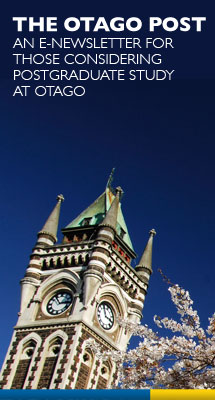 Friday 25 October 2013 4:26pm
Friday 25 October 2013 4:26pm Law PhD candidate Xiju Zhao
Law PhD candidate Xiju Zhao
A PhD student from Shandong Province in China is researching the duty of medical practitioners from both western and Chinese traditional medicine to inform patients about alternative medical treatment options.
Xiju Zhao is based in Otago's Faculty of Law, where he commenced his PhD in April 2008 under the supervision of Professors Mark Henaghan and Peter Skegg. This followed his visit to the Faculty in 2006 as a China Scholarship Council scholar, when he became increasingly interested in the expansion of the informed consent doctrine, in particular to include a duty to inform patients about alternative procedures and treatments.
Xiju chose Otago for his PhD because of the Faculty's international standing and, in particular, its acknowledged expertise in medical law. He rates his experience so far highly.
“Every part of the Law Faculty, including the Law Library, is very helpful. Being a postgraduate student in the Law Faculty means becoming a part of its staff. Postgraduates are warmly invited to attend all staff seminars and some staff events. The Faculty is also very open-minded towards other countries' efforts to improve their law, and has successfully offered community correction training programs for Chinese legal professionals on several occasions.”
Xiju's research addresses issues such as the distinctive elements of the informed consent doctrine, the circumstances where a duty to inform a patient about alternative treatments might be enhanced or weakened, and the ambit or scope of such a duty.
It also attempts a tentative exploration on the question of how the law should respond to alternative therapies that formed between Complementary and Alternative Medicine, and conventional medicine.
“There is very little research in the area of the duty to provide information about alternative treatments,” says Professor Henaghan. “[Xiju's research] will be ground-breaking. In China, traditional Chinese medicine and western medicine are taught together. There are some western practitioners that do use alternatives such as acupuncture but it is not common. The thesis will explore the degree to which and how patients should be informed about alternatives. It will be very valuable.”
Xiju plans to return to lecturing at a university in China once he completes his degree, but says he will also continue with research in this area. Meanwhile, he is enjoying his Otago postgraduate experience.
“The University of Otago's ranking as the top university for research in New Zealand provides a convincing footnote for its research excellence and quality,” says Xiju. “The number of PhD students and the diversity of research profiles at Otago are amazing, and the University makes every effort to help PhD students fulfill their goals.”
